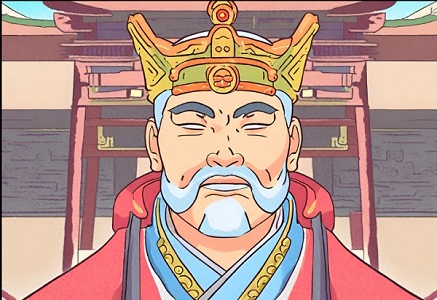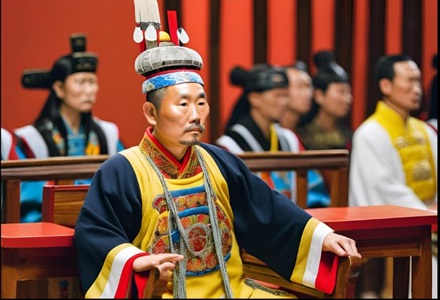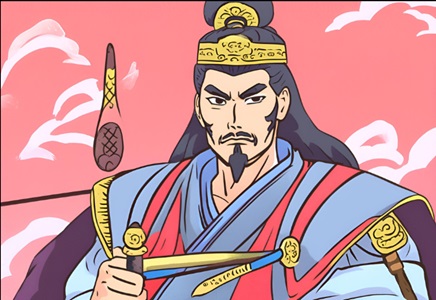Title of Biography in Chinese, Pinyin: 夏启传 (Xià Qǐ Zhuàn).
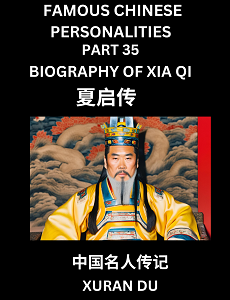
Title of Biography in English: The Biography of Xia Qi.
Check out books on my Amazon and Barnes & Noble homepages as well as the following pages to learn Biographies of famous Chinese personalities-
- Part 1 – Chinese Biography Book Series for Beginners
- Part 2 – Chinese Biography Book Series for Beginners
- Part 3 – Chinese Biography Book Series for Beginners
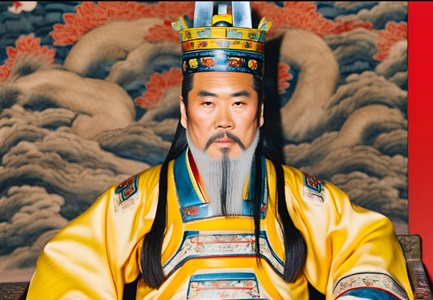
The Biography of Xia Qi in English (英文传记)
The Biography of Xia Qi
Xia Qi, the second monarch of the Xia Dynasty and the son of Xia Yu, is renowned for introducing the hereditary succession system that shaped the political landscape of the dynasty.

Upon ascending to the throne, Xia Qi faced the crucial task of consolidating the regime and passing down the Xia Dynasty’s reign. Recognizing the importance of power transition, he implemented the hereditary succession system, ensuring that the throne would be passed down to his descendants. This system was later adopted by subsequent dynasties and became an integral part of ancient Chinese political systems.
In politics, Xia Qi focused on strengthening central authority and consolidating the royal ruling position. He established official positions, formulated laws, and gradually improved the country’s administrative and legal systems. Additionally, he emphasized military construction, enhancing the country’s defensive capabilities.
Economically, Xia Qi encouraged agricultural production, promoted the construction of water conservancy facilities, and improved irrigation capabilities for farmland, thus contributing to agricultural development. He also pushed for the development of handicrafts and commerce, strengthening the country’s economic strength.
Culturally, Xia Qi attached great importance to the construction of etiquette systems, advocating moral concepts such as respecting the elderly, loving the young, and filial piety. He also ordered the collection and collation of historical documents, leaving behind valuable cultural heritage for later generations.

During Xia Qi’s reign, the Xia Dynasty achieved significant progress in politics, economy, and culture, laying a solid foundation for the establishment of subsequent dynasties. With his outstanding political talent and profound political vision, Xia Qi became an outstanding monarch in the history of the Xia Dynasty.
Learn Biography Of Xia Qi in Chinese (中文传记)
夏启传
夏启,夏朝的第二位君主,也是夏禹的儿子,以其开创夏朝世袭制的统治方式而著称。
夏启在继承父位后,面临着稳固政权和传承夏朝统治的重大任务。他深知权力交接的重要性,于是决定实行世袭制,将王位传给自己的子孙后代,这一制度为后世王朝所沿用,成为中国古代政治体制的重要组成部分。

在政治上,夏启注重加强中央集权,巩固王室的统治地位。他通过设立官职、制定法律等手段,使得国家的行政管理和法律制度逐渐完善。同时,他还注重加强军队建设,提升国家的防御能力。
在经济方面,夏启鼓励农业生产,兴修水利设施,提高农田的灌溉能力,促进了农业的发展。此外,他还推动了手工业和商业的发展,使得国家的经济实力不断增强。
在文化方面,夏启注重礼仪制度的建设,提倡尊老爱幼、孝敬父母的道德观念。他还下令搜集和整理历史文献,为后世留下了宝贵的文化遗产。
夏启的统治期间,夏朝的政治、经济和文化都得到了长足的发展,为后世王朝的建立奠定了坚实的基础。他以其卓越的政治才能和深远的政治眼光,成为了夏朝历史上一位杰出的君主。
Xia Qi Biography Keywords- English, Chinese & Pinyin (关键词)

- 夏启 (Xià Qǐ): The protagonist of the biography, the second monarch of the Xia Dynasty and the son of Xia Yu.
- 世袭制 (Shìxí Zhì): The system of hereditary succession that Xia Qi implemented, passing the throne to his descendants and becoming an important component of ancient Chinese political systems.
- 中央集权 (Zhōngyāng Jíquán): Xia Qi’s emphasis on strengthening central authority and consolidating the royal ruling position.
- 水利设施 (Shuǐlì Shèshī): The water conservancy facilities that Xia Qi promoted to improve irrigation capabilities and promote agricultural development.
- 礼仪制度 (Lǐyí Zhìdù): The etiquette system that Xia Qi emphasized, promoting moral concepts such as respecting the elderly, loving the young, and filial piety.
Pinyin of Xia Qi Biography (夏启传记的拼音)
xià qǐ, xià cháo de dì èr wèi jūnzhǔ, yěshì xià yǔ de érzi, yǐ qí kāichuàng xià cháo shìxí zhì de tǒngzhì fāngshì ér zhùchēng.

Xià qǐ zài jìchéng fù wèi hòu, miànlínzhe wěngù zhèngquán hé chuánchéng xià cháo tǒngzhì de zhòngdà rènwù. Tā shēn zhī quánlì jiāojiē de zhòngyào xìng, yúshì juédìng shíxíng shìxí zhì, jiāng wángwèi chuán jǐ zìjǐ de zǐsūn hòudài, zhè yī zhìdù wèi hòushì wángcháo suǒ yányòng, chéngwéi zhōngguó gǔdài zhèngzhì tǐzhì de zhòngyào zǔchéng bùfèn.
Zài zhèngzhì shàng, xià qǐ zhùzhòng jiāqiáng zhōngyāng jíquán, gǒnggù wángshì de tǒngzhì dìwèi. Tā tōngguò shèlì guānzhí, zhìdìng fǎlǜ děng shǒuduàn, shǐdé guójiā de xíngzhèng guǎnlǐ hé fǎlǜ zhìdù zhújiàn wánshàn. Tóngshí, tā hái zhùzhòng jiāqiáng jūnduì jiànshè, tíshēng guójiā de fángyù nénglì.
Zài jīngjì fāngmiàn, xià qǐ gǔlì nóngyè shēngchǎn, xīngxiū shuǐlì shèshī, tígāo nóngtián de guàngài nénglì, cùjìnle nóngyè de fǎ zhǎn. Cǐwài, tā hái tuīdòngle shǒugōngyè hé shāngyè de fǎ zhǎn, shǐdé guójiā de jīngjì shílì bùduàn zēngqiáng.
Zài wénhuà fāngmiàn, xià qǐ zhùzhòng lǐyí zhìdù de jiànshè, tíchàng zūn lǎo ài yòu, xiàojìng fùmǔ de dàodé guānniàn. Tā hái xiàlìng sōují hé zhěnglǐ lìshǐ wénxiàn, wèi hòushì liú xiàle bǎoguì de wénhuà yíchǎn.

Xià qǐ de tǒngzhì qíjiān, xià cháo de zhèngzhì, jīngjì hé wénhuà dōu dédàole chángzú de fǎ zhǎn, wèi hòushì wángcháo de jiànlì diàndìngle jiānshí de jīchǔ. Tā yǐ qí zhuóyuè de zhèngzhì cáinéng hé shēnyuǎn de zhèngzhì yǎnguāng, chéngwéile xià cháo lìshǐ shàng yī wèi jiéchū de jūnzhǔ.
